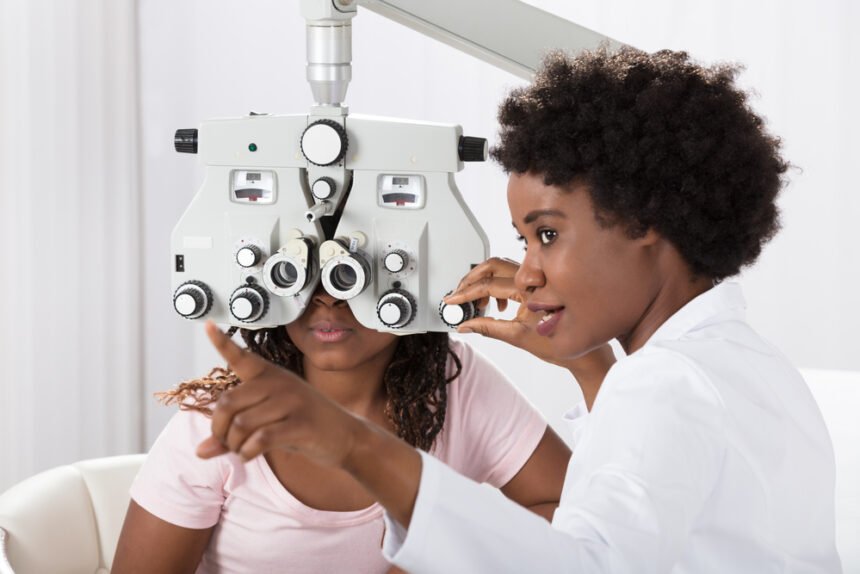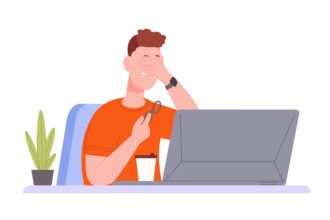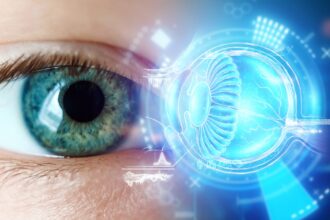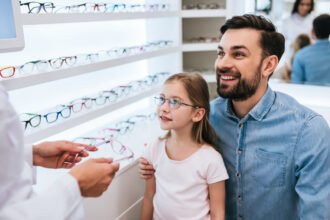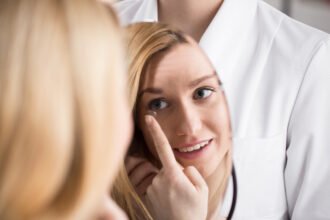Everyone needs a routine eye test, irrespective of their age. There’s no way you can be sure that your eye is fully healthy unless you take a comprehensive dilated eye exam. Many eye care professionals recommend getting this comprehensive eye exam every one to two years, depending on your age and certain risk factors.
This exam can determine whether or not you’ll need glasses. It also helps detect eye conditions in their early stages. During this examination, the eye care specialist adds drops into each eye to widen or dilate the pupil, which enables him or her see into the back of the eyes and detect any defect. Take regular eye exams to protect your eyesight and keep it at its best.
Eating Healthy Foods & Staying Fit
The food you eat also works to improve your eyesight. A study has shown that consuming a diet that’s rich in fruits and vegetables promotes eye health. Vitamins and minerals which have antioxidant and anti-inflammatory properties like vitamins A, C, E, and zinc are all good for eye health.
Nutrients like omega-3 fatty acids that are gotten from fish, nuts, seeds, and beans, also improve eyesight and play a role in reducing age-related eye disease. The carotenoids lutein and zeaxanthin, found in leafy green vegetables, broccoli, zucchini, and eggs, are essential for the eyes.
These carotenoids improve pigment density in the macula and absorb ultraviolet and blue light. Eating a well-balanced diet also helps you stay at a healthy weight, which helps lower your risk of developing any eye-related diseases.
Exercising and maintaining a healthy weight are helpful to the eyes. Conditions such as diabetes (type 2) or other systemic disorders, which are prevalent in overweight or obese people, can cause damage to the tiny blood vessels in the eyes.
Also, high blood sugar levels gradually damage the blood vessels in the retina, causing them to leak blood and fluid into the eye, thus, harming your vision. It can also result in the growth of scar tissue and new, abnormal blood vessels. Moreso, changes in your blood sugar level can cause blurry vision. Leading an active lifestyle and getting your blood sugar levels checked puts you at a better chance of avoiding vision complications.
Wearing Protective Eye-wear & Resting Your Eyes
A range of everyday activities like sports, household chores, or working with certain types of equipment or in a potentially hazardous environment can result in eye injuries. It?s vital to protect your eyes with appropriate eye-wear. Protective eye-wear like safety glasses, goggles, visors, and helmets help protect the eyes, prevent injuries, damages, and irritation.
Sunglasses are also necessary protective eye-wear. Look for shades that block 99 to 100 percent of UVA and UVB radiation. The right pair of sunglasses will protect the eyes from ultraviolet (UV) light. Excessive exposure to UV light puts you at risk of developing eye cancer, cataracts, and eye growths like pterygium.
The eyes need a break now and then. Focusing on a thing for an extended period can lead to fatigue or eye strain. If you spend lots of time in front of computers or mobile devices, you may want to try the 20-20-20 rule to ease eyestrain. In this rule, for every 20 minutes that you spend staring at a screen, look at something else 20 feet away for 20 seconds. A study has shown that spending time outdoors and less time on activities that require constant up-close focusing can help protect the eye and reduce the chance of experiencing vision loss.
Conclusion
The eye is critical, and the steps above will enable you to improve and protect it. And now, it turns out that there are apps that also help protect eyesight. I will share the list of apps to help protect the eyesight that I came across during my research.
Read: Apps to Help Protect Eyesight
In addition to following the above steps to improving and protecting your eyesight, you can always check out the list and pick an app that best suits your healthcare services needs.

